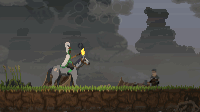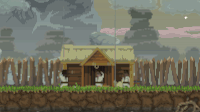Citizen house[1] is a kingdom structure built from the remains of a destroyed vagrant camp, where the Monarch can recruit citizens.
Developer's description[]
“ This new structure provides a solution for recruiting new citizens after clearing out a vagrant camp. Maybe you want to make a clean-looking kingdom. Perhaps you accidentally cleared around your last camp. Whatever the reason, vagrant camp ruins can now be rebuilt into a Citizen House. Once constructed, it will provide a ready source of new citizens, albeit at a higher cost.—Conquest Update announcement[2] „
“ Do you ever find yourself cutting down trees around vagrant camps and then instantly regretting the choices you’ve made? No need to worry! This patch allows you to build citizen houses from the ruins of a vagrant camp. There, you can always recruit new citizens to defend your Kingdom at an increased price.—Conquest Update patch notes[3] „
House[]
Building[]

Building, waiting for new citizens, and recruiting.
If a vagrant camp is destroyed, the Monarch will have the option build a citizen house in its place. To destroy a camp, the Monarch has to mark at least one of its perimeter trees to be cut down.
Once the background vegetation has fully faded away, the option to order the construction immediately appears at the wreckage of the camp. The house costs eight coins, and requires builders to work on the scaffolding and erect the structure. As usual, up to two builders can work on its construction at the same time.
It takes quite long to build (≈57 hammer hits).[4] Only one builder working on it would take about fifty real life seconds, or almost one third of an in-game daytime period, to finish the job.
There is no specific limit for the number of citizen houses a Monarch can build. A kingdom may have as many citizen houses as the number of vagrant camps on the land.[5]
Safety and protection[]
The site does not require walls around, for the house to be establised. Likewise almost all other buildings in the Kingdom, the greed does not attack the house, and cannot damage it in anyway. However, the same way a farmhouse does not protect farmers against the Greed, a citizen house offers no shelter for its occupants. The whole situation being a bit worse in this case, because, unlike farmers, citizens do not run away from the Greed.
With that in mind, building a citizen house outside of the Kingdom's borders may still be a valid option, if the Monarch can recruit the citizens before nighttime, or if they don't care about losing a couple of citizens every now and then.
Accommodation capacity[]
The structure can support up to three citizens. This represents a fifty percent larger accommodation capacity if compared to the support provided by vagrant camps (only for two vagrants).
Citizen[]

Three citizens in Europe, Shogun, and Dead Lands.[6]
Citizens are the subjects that gather around the houses. Unlike vagrants on camps, they do not wander around, they don't grab coins from the ground, and they don't seek bread from the bakery. Citizens remain where they appear repeating the same idle animation, until they're either recruited by the Monarch or "attacked" by the Greed.
Aspect[]
Citizens look exactly like the villagers of each setting, but in white robes / overalls. This could be explained by the fact that, despite being similar to vagrants in their role, they do not live in the wild.
Appearance rate[]
A new citizen appear in front of the house approximately every three minutes and twenty seconds (3min 20s) in real life, which correspond to almost an entire day in game. This rate is noticeably slower than the rate on vagrant camps (every two minutes, which equates to twice new vagrants per day).
Recruiting[]
A citizen can be convinced to become a villager by paying the house five coins. The much higher cost may be due to the fact that they already live in far better conditions than vagrants on camps.
When recruited to become a villager, they change the color of their clothes, and start looking for a tool or weapon.
Vanishing[]
If a greedling touches a citizen, all citizens at that house instantly disappear. Unlike all other subjects when they see the Greed approaching, citizens do not run anywhere. Also, unlike the Banker or the Gem Keeper, they do not hide inside the house.
Oddly, greedlings do not try to charge against them. As they pass by the house, and carelessly touches a citizen, all citizens there simply vanish into thin air. They do not reappear the next morning.
Just like vagrant camps, none of that affects the appearance rate of new citizens. As expected, a single citizen may appear at the house the next morning (or after the wave). But the ones that vanished while the Greed passed by them, are gone for good.
Purpose and usefulness[]
| Historical context |
|---|
| For years (and until today in the previous titles), Monarchs were afraid from destroying their only source of people on an island: vagrant camps. Since the release of Kingdom: Classic, Monarchs, very early in the morning or even before dawn, have tried to run past huge stretch of forests to make a clearing, build a wall, and preserve the camp inside that area. None of that has changed. |
Technically citizen houses allow for easily clearing a forest beyond the camp site without completely losing the ability to recruit new villagers. They mainly exist to avoid soft locks, where monarchs were unable to progress after accidentally removing all camps on a land. They may be temporarily useful, after clearing a camp that was suffocating the expansion of the Kingdom, and before being able to recruit from the second camp on that side, or before setting up a bakery. They may be occasionally useful if the Kingdom is sided by a woodland with no clearings.
Citizen houses are not meant to:
- be a sort of "upgraded" vagrant camps
- be a primary strategy for any Kingdom
- replace the classic tactic of building a wall beyond a preserved vagrant camp
- cancel all the negative consequences of removing vagrant camps.
In general, clearing all vagrant camps is considered a bad strategy. With or without citizen houses, completely eradicating homeless camps on a land, has the potential of cornering the Kingdom towards a very dangerous situation, from which it may be hard or impossible to recover.
Additionally, having the option for building houses from camps, doesn't mean it is required or recommended to be done on all camps. Only relying on citizen houses—with their low appearance rate and elevated costs—for the recruitment of subjects is especially critical on islands that are left to be cleared from the Greed later in the campaign, where the Kingdom's army has to be considerably larger to hold counterattack waves, and on Challenge Islands (like Skull and Plague), where Blood Moon waves are more frequent early on, and ramp up in power much faster.
Achievement[]
Building a citizen house grants the "Arm the Homeless" achievement.
History[]
“ For the Norse Lands DLC we created a new building called the Citizen House. It played so well that decided it had to be available in all the lands.—Developer Gordon[7] „
| Date | Platform | Version | Change |
|---|---|---|---|
| 2021-12-10 | All | 1.1.14 | Reduced the recruitment cost from 7 to 5 coins. |
| Change | |||
| Reduced the recruitment cost from 7 to 5 coins. | |||
| 2021-11-16 | All | 1.1.13 | Introduced. |
| Introduced. | |||
See also
References[]
- ↑ Also known as shelter.
- ↑ The Conquest Update (announcement). Steam. 10 November 2021.
- ↑ Conquest Update Patch Notes. Steam. 16 November 2021.
- ↑ This is an approximate value, calculated by counting hits in game. It is close to the correct number, but not exact.
- ↑ Tested for two houses only, on v.1.1.14.
- ↑ Outdated picture: citizens do not have the same appearance in all settings.
- ↑ Dev Blog 02 - You Can't Spell Balance Without Alan. Steam. 19 October 2021.
